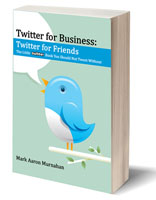Twitter Fame can come from tweeting frantically, as if your butt is on fire and Twitter will bring you a bucket of water to put it out. If you have not already learned this tactic, I will explain it. According to many estimates, there is a very small percentage of “power users” who send the majority of all updates on Twitter. How extreme is it? As a Harvard Business study pointed out, 10 percent of Twitter users account for 90 percent of Twitter updates.
Allow me to shock you for a moment with an observation.
Twitter Politics, Pandering, and Popularity
Some of the most powerful Twitter users are using old school tactics of politics, pandering, and heavy handing to get their word out. When this happens, they throw the great notion of transparency and dignity out the window.
Why do they do this? Power is the best answer I can find. It is a power that is largely more about ego than money … it is a power that some hold dear as they seek to be “King of the Geeks” or “The Most Popular” on Twitter. To their regret, it still does not return all that they hoped. They just find a few pea-brains to clap their hands and make them feel important.
Sure, you may not see this behavior, but it is just another part of my job to tell you it is there, and that it is quite pervasive. It has an impact on the whole community, and I hope you can see why it matters.
When considering that “other” 90 percent of Twitter users, I find it tragic that so many people have not yet found the great enjoyment and value of reaching out and joining the great conversation of Twitter. More tragic than that, is that it can lead to an ever greater opportunity for the “power users” or “Twitterati” to influence Twitter with a narrowed view designed to suit their agenda. Sure, you can say that it still allows for the voice of the people, but when it gets too carried away with chasing an algorithm to appear as the most popular, it is still a deception in many ways.
The tactics that some seemingly “valuable” Twitter users will use is to play a role to make others believe “how Twitter really works” and what is “important” to the Twitter community. Fine, call them “leaders”, and in some ways, they are. I want to remind you that it is easy for many people to fall into a bad habit and think it is the right thing to do because “everybody else is doing it”. Your parents surely posed the question to you something like: “If all of your friends were jumping off a cliff, would you do it, too?”
Some of these “valuable” users (often called Twitterati) try to promote getting more Twitter followers, and others will try to manipulate and even threaten others to promote their message. I saw the latter in a really ugly way when somebody who previously unfollowed me and blocked me then joined into a petty power play asking people to unfollow my Twitter feed, hoping people would stop listening to me. It was totally political and childish, and it was not because I was poaching whales or beating up little kids. I was simply being honest, and being me … many people sent me messages of respect after that rant.
It was not too long before this person came to seek me out and talk up their respect for me while asking for favors again and asking me to retweet their latest promotion. I guess my retweet was valuable, but yet, not quite valuable enough to treat me like a real person, but rather a megaphone.
Quick, Twitter … Get Me a Bucket!
The type of user I am talking about will often tweet like their butt is on fire and somebody should bring them a bucket of water. They try to send enough Twitter updates to be sure that everybody will see their name, without regard for whether it is good, bad, or indifferent. I would never complain about somebody tweeting a lot, because I do that, but I try to keep it interesting, relevant, and a two-way communication. However when people just send a rapid-fire barrage of popular links from Google Trends, Digg, Stumble, and Alexa Hot Urls with some advertisements for their clients who hired them for their amazing social media acumen mixed in there, and sent with hopes and demands for others to retweet it for popularity, the relevance and value of Twitter suffers. Then they will retweet some random thing that you sent, just to remind you that you should be retweeting their agenda, and if you do it, you may get even more of their favor of retweeting something you sent that they never even read or cared a damn about. It can even be worse with an innuendo that if you do not cater to them, they will badmouth you and tell people to unfollow you. It all gets far too High School-like. Now, I have a different reason for asking for a bucket … See the video below. 😉
If you liked this article, please share your comments. This also goes well in line with the subject of two of my blog articles titled: “Do You Tweet and Retweet Seeking Favors?” and “Twitter Follower Frenzy“.
If you really liked this article, please order my new book, “Twitter for Business: Twitter for Friends“.

